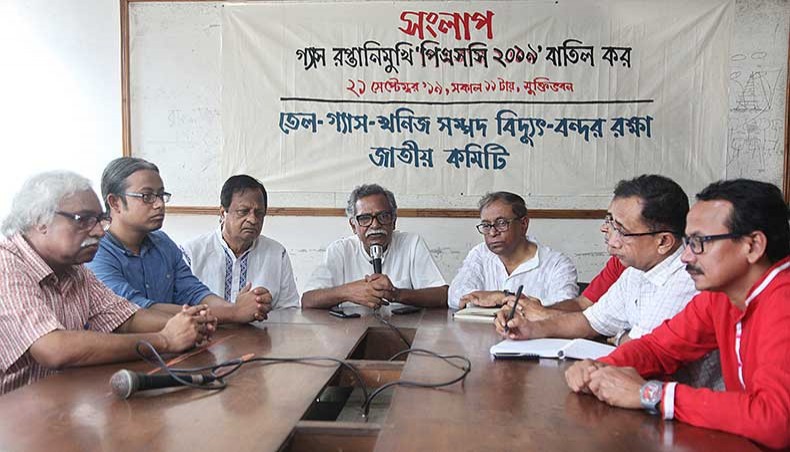
Sunday, September 22nd, 2019
New PSC to strip Bangladesh of gas ownership: oil-gas committee

The new model production sharing contract allowing export of gas would strip Bangladesh of its ownership over the natural resource, observed participants at a dialogue organised by the National Committee to Protect Oil, Gas, Mineral Resources, Power and Ports on Saturday.
They said their argument on the PSC 2019 that the cabinet committee on economic affairs passed recently was based on what they learnt from media reports and other secondary sources as the government was yet to make the document public.
‘The government has created every opportunity for foreign companies to own country’s natural resources,’ said the national committee’s member secretary Anu Muhammad.
‘The provision for exporting gas explored offshore stands against the interest of the country,’ he said.
The decision to export gas lays bare that the government spread propaganda about depleting gas reserves to create opportunity for certain individuals and businesses to produce power from coal and other relatively harmful energy sources, said Anu Muhammad.
Engineer Kallol Mustafa in a presentation focused at key provisions in PSC contract giving foreign companies more control over gas than the government.
The PSC designates 70 per cent gas extracted in deep sea as cost recovery gas for companies, he said.
Profit from selling the rest 30 per cent would be shared between companies and the government, he said.
Though the companies were bound to sell gas first to the government owned Petrobangla, a provision was there in the PSC allowing the companies to sell gas in international market for getting legitimate price, he said.
The PSC also allows the companies to extract gas in deep sea blocks without any regard to internal demand in the country, he said.
‘It is obvious that Bangladesh cannot afford to consume all gas once foreign companies exploring in deep sea go into production,’ said Kallol Mustafa.
The result would be obvious that the Petrobangla would not need all that gas and let companies sell in the international market, he said.
Kallol predicted domestic gas demand to remain low in coming years with the government relying more on imported CNG, oil and coal for producing power.
‘These conditions lead to one point: Export gas,’ said Kallol.
The military backed caretaker government in 2009 passed a model PSC allowing export of natural gas on the excuse of Bangladesh floating on huge reserve of gas.
A massive protest flared up against the gas export decision, calling for the government to release scientific data on gas reserve before exporting.
The provision of gas export was eventually dropped after the AL government reviewed the model PSC in 2012.
‘It seems the government decided to trade natural resources for sticking to power,’ said Anu Muhammad, referring to a statement given by prime minister Sheikh Hasina accusing her counterpart in opposition BNP of coming to power by pledging to hand over gas resources to foreign companies.
Economist MM Akash, Communist Party of Bangladesh leader Ruhin Hossain Prince, LDA coordinator Saiful Haque and researcher Maha Mirza participated in the dialogue held at Mukti Bhaban in Dhaka.







